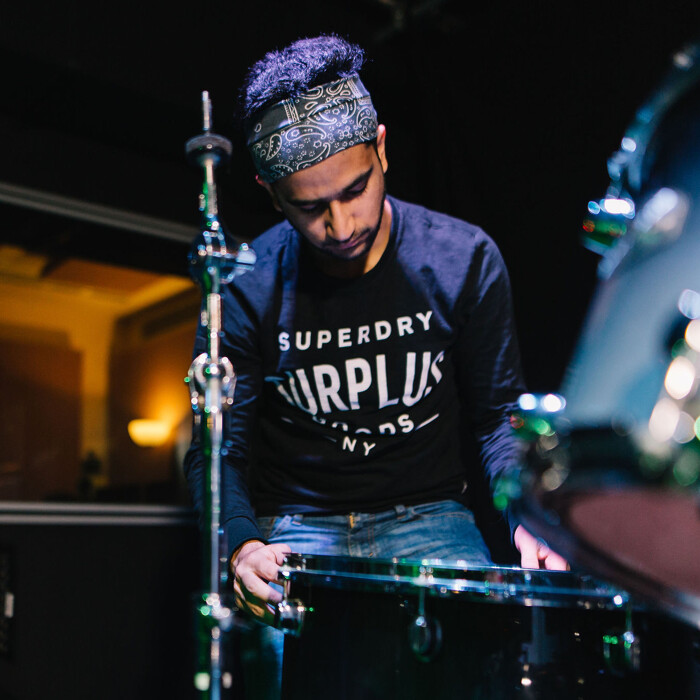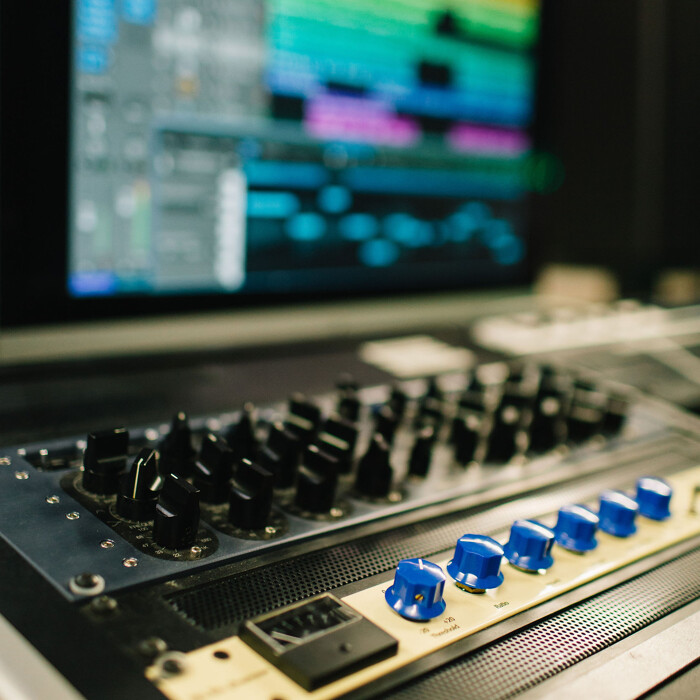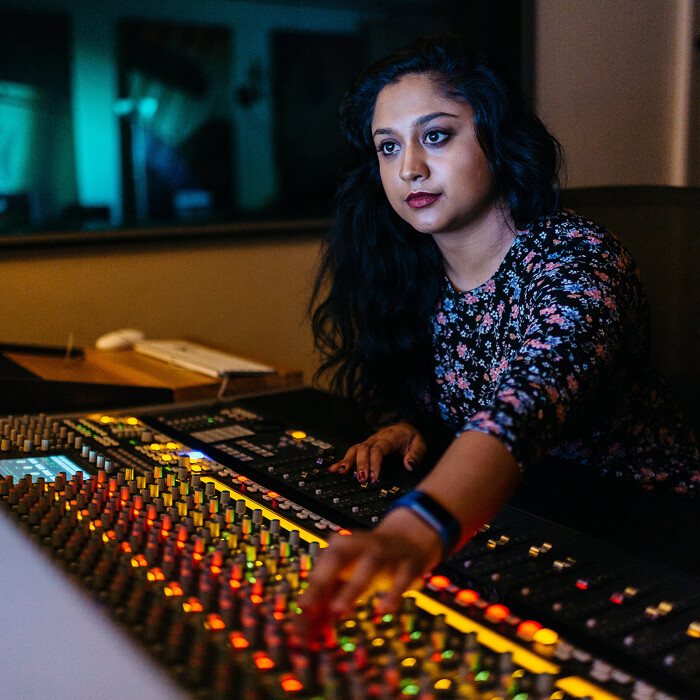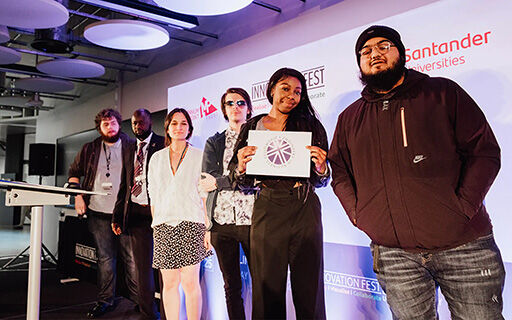
Sound Engineering and Production with a Foundation Year - BSc (Hons)
Currently viewing course to start in 2025/26 Entry.
BSc (Hons) Sound Engineering and Production with a Foundation Year will provide you with the creative skills and versatility you need to succeed in a constantly evolving industry. You’ll have access to world-class facilities so that you can experiment with music production, sound engineering, audio electronics and much more....
- Level Foundation
- Study mode Full Time
- Award BSc (Hons)
- Start date September 2025
- Fees View course fees
- Subjects
- Location City Centre
This course is:
Open to International Students
Overview
I'm a third year Music Technology student. When I was looking for Music Technology courses, Birmingham City University really stood out to me. I was keen on attending a Bachelor of Science and the course really focussed on the science aspects as well as maintaining the artistic elements of music and sound production. The support of the tutors has been fantastic. The professional standard and the facilities on campus are great due to their accessibility around the clock. The easy access to studios has been extremely helpful in completing my work and keeping on top of deadlines. At BCU, there's been a heavy focus on employability and what I could do with all aspects of my degree. The university has organised the industrial mentor forum, a space where students can communicate with alumni and people within the industry. The Acoustics Special Interest Group also consisted of more bespoke talks from people within the acoustics industry about different aspects of the work and how individual companies run. This is how I developed contact with an acoustic consultancy to complete my placement year. I act as an Acoustic Technician at Dragonfly Consulting. It went so well that I'm returning upon my graduation to continue working with them. The university has given me opportunities I don't think I would have received anywhere else.
I'm a second year computer science student studying at Birmingham City University. As a Computing student, there are plenty of computer labs available. There's entire rooms filled with Cisco networking equipment, as well as laptops that can be rented out to complete your work. Several of the facilities have now moved over to STEAMhouse, which is a £70 million build that is now the new home for Computing and Digital Technology students. One of the main things for me was getting employment at the end of my university degree. And Birmingham City University offers a wealth support for moving into the work environment. The course is a very important focus and a very industry focussed as well. I've been offered roles as a student demonstrator for Python programming. I found that the best way to show that you've understood something is to be able to teach somebody else.
I'm studying Computer Networks and Security. So far, I've really enjoyed my time at BCU. I felt really included within the student community. For the past two years, I've been involved in Innovation Fest. This is an annual event that showcases student work from the faculty. A lot of employers visit this festival, which allows us to widen our professional network. Throughout my time at BCU, I've had some time to
develop a relationship with the Careers+ team and go through tailoring my CV and my cover letters with them. Because of this, I have been presented with many opportunities which they have tailored to me and my needs. Through this, I was encouraged to apply for the women in tech competition.
So it was a one week program and I was working with the team from Cyferd. It's a software company,
and I successfully won and have taken up the placement year with them as a Junior Development Lead.
I look forward to coming back and applying the skills I've learnt throughout my placement and applied them within my studies.
BSc (Hons) Sound Engineering and Production with a Foundation Year will provide you with the creative skills and versatility you need to succeed in a constantly evolving industry.
You’ll have access to world-class facilities so that you can experiment with music production, sound engineering, audio electronics and much more.
Available in the UK to home and international students, the course enables you to study a diverse programme, ensuring students are incredibly well equipped for employment within the industry once completing their degree.
About the Foundation Year
The Foundation Year course option enables you to study for our BSc (Hons) degree over an extended full-time duration of four years by including a Foundation Certificate (year one of four). The Foundation Certificate provides a broad study programme that underpins the follow-on degree. In order to progress to the next year of your degree, it is necessary to achieve a pass in all of the modules of the Foundation Certificate.
What's covered in this course?
Designed to meet the requirements found within the audio industry, you’ll engage with a dynamic study programme that focuses on live and studio sound engineering, audio electronics, audio software engineering, acoustics and business principles. This combination of subjects ensures you’ll be employable in a range of career paths.
You’ll be able to use technology to assist in the capture and manipulation of sound. You’ll also combine practical, hands-on training with theoretical and academic understanding, giving you a holistic conception of sound technology.
Audio engineering is a highly dynamic sector, driven by rapid technological advancement. We will ensure that you have the skills to develop and maintain the next generation of models for production, performance and measurement.
You’ll also develop key transferrable skills, such as teamwork, reflection and self-awareness. Plus, gain analytical skills through coursework tasks, and enhance your problem solving ability by using a range of systems and technologies.
Throughout the duration of your course you will be presented with several chances to gain hands-on industry experience, through musical festivals, events and much more. As a Sound Engineering and Production student, you could undertake trips through the Live Sound Society.
Accredited By
This course is accredited by:
"One of the best things about the course was how wide ranging it was. It enabled me to take a holistic look at the audio industry in general.
I really appreciated the technical elements of the course because whilst I really enjoyed all the studio recording and live sound modules, the fact that the course really opened my eyes to the world of programming and that sort of engineering really enabled me to get a strong technical background which is what got me the job at Spotify. Support and Surveillance Specialist at Spotify, New York City.
I was very happy with the course. The biggest thing for me was the breadth. I know people from my year of the course who have gone on into research, live sound, low level engineering, film, composition, all sorts of different areas of the music industry. The great thing about the course is that it doesn’t consign you into one area, it gives you the tools that you need to develop your understanding of which ever area you choose to rather than directing you into one area in particular." Ashley Eastwood, Engineer, Product Engineering at Music Group
Why Choose Us?
- Facilities at STEAMhouse - Based at our expanding City Centre Campus, this unique state-of-the-art building gives you access to outstanding facilities and teaching spaces, as well as opportunities to collaborate with people and businesses across multiple sectors and work on real industry-based projects.
- Range of industry opportunities - Graduates of this course have successfully entered the audio industry, working in live sound, software development, production, sound design and audio post, through to product development, acoustic consultancy and education.
- Preparation for employment - This course will prepare you for the range of technology-orientated career paths in the highly dynamic audio technology environment. Our students have gone to work with companies such as Eurotec International and BBC.
- Get real life work experience - This course has the option of a sandwich year which you can take between your second and final year.
- Members of WISE - Inspiring female talent in physics and computing.
- State-of-the-art campus and facilities - You’ll be taught across our three City Centre Campuses that include; Millennium Point, which has recently had a £6.5 million investment in facilities; the £57 million Royal Birmingham Conservatoire; and £62 million Parkside Campus. Find out more about our campuses.
- Be inspired - Adam has Autism and other mental health conditions but he hasn’t let it get in the way of achieving a first-class degree. Read about how Adam applied through clearing and started his journey at BCU.
Similar Courses
Open Days
Join us for an Open Day where you'll be able to learn about this course in detail, chat to students, explore our campus and tour accommodation. Booking isn't open for this event yet, register your interest and we'll let you know as soon as booking goes live.
Next Open Day: 28 June 2025
Entry Requirements
These entry requirements apply for entry in 2025/26.
All required qualifications/grades must have been achieved and evidenced at the earliest opportunity after accepting an offer to help confirm admission and allow for on-time enrolment. This can also include other requirements, like a fee status form and relevant documents. Applicants can track their application and outstanding information requests through their BCU mySRS account.
Essential requirements
80 UCAS Tariff points. Learn more about UCAS Tariff points.
If you have a qualification that is not listed, please contact us.
Fees & How to Apply
UK students
Annual and modular tuition fees shown are applicable to the first year of study. The University reserves the right to increase fees for subsequent years of study in line with increases in inflation (capped at 5%) or to reflect changes in Government funding policies or changes agreed by Parliament. View fees for continuing students.
Award: BSc (Hons)
Starting: Sep 2025
- Mode
- Duration
- Fees
- Full Time
- 4 years
- £9,535 in 2025/26 ✱ Important note for this price
- Apply via UCAS
(↩Back to price) * The Government is proposing to increase the cap on full-time regulated tuition fees to £9,535 for 2025/26 and the University is planning on increasing fees to that maximum level once legislation is enacted. Part-time fees are charged pro-rata, where applicable.
International students
Annual and modular tuition fees shown are applicable to the first year of study. The University reserves the right to increase fees for subsequent years of study in line with increases in inflation (capped at 5%) or to reflect changes in Government funding policies or changes agreed by Parliament. View fees for continuing students.
Award: BSc (Hons)
Starting: Sep 2025
- Mode
- Duration
- Fees
- Full Time
- 4 years
- £17,690 in 2025/26
Guidance for UK students
UK students applying for most undergraduate degree courses in the UK will need to apply through UCAS.
The Universities and Colleges Admissions Service (UCAS) is a UK organisation responsible for managing applications to university and college.
Applying through UCAS
- Register with UCAS
- Login to UCAS and complete your details
- Select your course and write a personal statement
- Get a reference
- Pay your application fee and submit your application
Course in Depth
Foundation Year
In order to complete this course a student must successfully complete all the following CORE modules (totalling 120 credits).
The Foundation Mathematics module provides the basic knowledge and mathematical skills which will equip the students to continue their studies to an undergraduate programme. The module will be focused on mathematics related to the field of computing. The interactive taught sessions will use fundamental mathematical in discussions to broaden understanding of the theory and practice introduced in the module.
This module will provide you with an understanding of the role of digital technologies in transforming industries and sectors. It will provide you with a comprehensive introduction to core concepts of science for digital technology, and an understanding of the fundamental aspects of science essential for studying and working with digital technologies.
You will learn systems thinking methodologies to model systems supported by digital technologies, enabling you to understand different aspects of technology, and to design your own solutions. Moreover, this module will help you to develop essential academic and personal study skills necessary for success in higher education. It will provide you with basic research, academic writing, and reflection skills. These skills are vital for your transition to higher education and will enhance your learning and academic growth.
This module provides the skills necessary to design a web based application around a clear understanding of the business information requirements, a structured design of an interface and the development skills necessary to implement a solution. This module focuses on varied technologies relating to the design and development of application to meet the information needs of a business. The module will analyse and design an application that meets current web standards.
This module, focused on emerging technologies, will provide you with an understanding of the latest advancements and trends in Computing and their applications. Through discussions, practical examples, and hands-on activities, you will gain knowledge and insights into how emerging technologies are shaping the digital landscape and the world.
During the journey within higher education, developing your independent study is an essential skill to support shaping the knowledge to become more useful and applied within practice. This module aims to provide you with necessary skills and tips that should support you to work independently within your discipline and to successfully apply project management tools and techniques to a mini project related to your subject discipline. Within the module, various tutorials will encourage the elements or creativity, innovation and thinking. The skills developed from this module acts as a foundation both towards subjects within your discipline, and more importantly, your final year’s project in Level 6. This module will be supported with 2hrs of extra module support session.
Foundations of programming aims to provide you with the fundamental principles and practice-based activities needed to begin developing software programs. The module details the anatomy of a structured software program that includes the creation of a program algorithm, a logical, simple and organised program flow and the generation of pseudo and programming code.
The module uses a combination of theory and practice-based sessions designed to engage students in group and individual activities to identify the components of a software program and to apply their knowledge into hands-on software programming activities. During the module sessions you will acquire the basic skills to design and create software programs.
Year One
In order to complete this course a student must successfully complete all the following CORE modules (totalling 120 credits).
This module will develop students’ understanding of acoustic fundamentals and will also develop a methodology for testing a range of musical instruments, using a range of applicable techniques to extract and analyse data. The scientific nature of this module will allow you to have a deeper understanding of sound, human hearing mechanisms and musical instruments, underpinning later modules in recording and acoustics.
This module provides a base for you to develop key skills in recording and mixing, imperative for all fields of music technology and sound engineering. You will become familiar with the hybrid analogue mixing/digital recording studio environment and explore recording techniques and processes applicable to a wide range of acoustic and electric instruments. You will study analogue-based audio systems and processes, and microphone technology. You will apply this knowledge through a series of studio based recordings.
This module will introduce the nature of digital signals, presenting the international standards for digital audio data and the common processes involved in the capture and processing of digital signals. Later the module will allow you to develop strong skills in the standards for compression and distribution of digital audio signals and via a cross discipline approach, the module will illustrate common methods form computing and how valid these are for digital signal distribution.
This module will give you a broad understanding of sound reinforcement for a range of scenarios of up to 250 audience capacity. As well as the practical skills of connecting and troubleshooting a range of equipment from analogue to digital, the module will also focus on the need for good theoretical skills, including room modelling and system prediction as well as understanding of electrical safety and safe operating practice.
Audio Software Development will provide fundamental knowledge for writing and developing audiorelated software tools. The field of audio production heavily relies on digital systems, which in turn require technical programming and logic skills for their implementation. Given the ubiquitous nature of digital technologies, this is a valuable skill to have as a sound engineer.
In this module, you will explore everything from compilers, instruction sets and hardware architectures up to programming concepts such as iterators and functions. The module finishes by introducing simple digital signal processing technologies and object oriented design. The module provides the knowledge base to excel in the technical modules in years 2 and 3.
This module will develop key understanding of electronic fundamentals as applied to audio systems. Subject matter relates primarily to the analogue domain and will encourage you to develop your passion for the equipment found in the studios, learn how they sound and what makes them important during the recording, mixing and mastering process. Specific attention is applied to audio transducers; loudspeakers, microphones and headphones.
Year Two
In order to complete this course a student must successfully complete all the following CORE modules (totalling 120 credits).
This module introduces you to recording sound for television and radio, sound effects, dialogue replacement (ADR), and mastering audio levels for broadcast using a project based approach. You will increase your employability through exposure to the skills used in the broadcast industry and working with actors and television crews in interdisciplinary activities involving students across different faculties.
This module enables you to develop an individual recording portfolio based on your personal areas of interest whilst acquiring core techniques and skills in key applications. It provides the opportunity to explore editing, mixing and a range of recording techniques to lay a foundation for more advanced recording and production work at Level 6.
Digital technology is widely used throughout all the stages of the digital media processing, production, transmission, distribution and broadcasting activities. This module provides application based fundamental digital signal processing (DSP) knowledge and skills.
This module will develop key understanding of audio systems, embedded systems and electronics. This module will encourage you to develop your passion for the equipment found in the studios, how they sound and why, and what makes them important during the recording, mixing and mastering process.
This module will allow you to gain an in-depth understanding of global music and audio industries and how organisations have sought to adapt to technological change. This module enhances employability through the development of your understanding of employer requirements and approaches to recruitment.
This module will develop students’ understanding of psychoacoustics through critique and analysis of academic work. Students will understand how to provide critical assessment of existing research work. This module will provide a practical insight into acoustic consultancy by assessing through theory and practice. It will cover building, interior and environmental acoustics in a way that aids employability by utilising methods that are typical of industrial practice.
Professional Placement Year (optional)
In order to qualify for the award of Bachelor of Science with Honours Sound Engineering and Production with Foundation Year and Professional Placement Year, a student must successfully complete all of the modules listed as well as the following Level 5 module:
This module is designed to provide you with the opportunity to undertake a credit bearing, 40-week Professional Placement as an integral part of your Undergraduate Degree.
The purpose of the Professional Placement is to improve your employability skills which will, through the placement experience, allow you to evidence your professional skills, attitudes and behaviours at the point of entry to the postgraduate job market. Furthermore, by completing the Professional Placement, you will be able to develop and enhance your understanding of the professional work environment, relevant to your chosen field of study, and reflect critically on your own professional skills development within the workplace.
Final Year
In order to complete this course a student must successfully complete all the following CORE modules (totalling 120 credits).
The purpose of the module is to enable you to undertake a sustained, in-depth and research informed project exploring an area that is of personal interest to you. In agreement with your supervisor, you will decide upon your topic which will take the form of a practical outcome (artefact) with accompanying contextual material. The main consideration when choosing your topic is that it must be aligned to the programme you are studying, and you should consider the relevance of this topic to your future academic or professional development.
At this level, you will be expected to work independently but you will receive additional one-to-one support from your supervisor, who will be familiar with your chosen topic area. As you progress on the module, extra support will be available and this may take the form of group seminars, workshops and online materials that will help to develop your project.
Based on prior study, this module assumes a good working knowledge of a range of digital mixing desks with a basic understanding of ground stacked PA systems. The module will enhance your skills to enable the planning of larger, more complex shows and provide practical simulations of these knowledge and in order to improve team working and troubleshooting skills. The module allows a deeper understanding of measuring and tuning PA systems, the operations and mathematics involved in rigging, and other show control systems such as DMX for lighting.
This module will cover the wide range of research areas within music information retrieval (MIR). The field of MIR emerged at the intersection of other areas in music research including audio signal processing, machine learning, music history, musicology, and music psychology. Current research in MIR consists of topics related to these fields, including music recommendation, automatic music transcription, optical music recognition, source separation, semantic audio applications. The aim of the module is to familiarise you with the topics in MIR, as well as to introduce methodological and presentation skills required for performing research in the field.
The module will cover linear and nonlinear systems, time and frequency domain processing algorithms and will explore future generations of methods in the field such as adaptive, cross-adaptive and intelligent music production systems.
The Game industry has overtaken the film industry in terms of revenue and audio is an integral part of developing high impact titles. In this module, you will explore the fundamentals of sound design for interactive environments, including sound effects, Foley sound, soundscapes and dialogue. The module will cover the integration of audio into game engines like Unity and middleware such as FMOD, and mixing techniques particular to the gaming industry.
Download course specification
Download nowHow you learn
You will be assessed both formatively and summatively by a number of methods. Formative assessment occurs throughout the programme and involves feedback from peers, tutors and individual reflection.
A range of summative assessment methods are employed involving both individual and group assignments, written coursework assignments and practical project work, laboratory experimentation, tests and examinations (seen and unseen, open-and closed-book). Assessment methods for each module are identified in a module guide and, for coursework, assessment details and criteria are specified in each assignment brief.
In accordance with the University Regulations you will be permitted two attempts at assessments. After your first sit, if you are unsuccessful in any of your assessments, there will be a final resit opportunity for which your mark, provided that you pass the assessment, will be capped at 40 per cent.
Attendance requirements
There are 30 attendance weeks in each academic year.
A typical week on this course will include 20 hours of contact time over four days, plus self study time.
International opportunities
The Centre has a partnership arrangement with the highly esteemed University of Rochester in New York State, USA. This exchange programme offers the opportunity for students to apply to study abroad for a semester in the second year. More generally, this arrangement feeds into the internationalisation of the course with students from the USA joining the cohort at BCU, opportunities for joint research projects and short academic exchanges.
Trips and Visits
Birmingham City University is located at the heart of the West Midlands, with a rich, vibrant music scene. With live venues from intimate jazz bars to rock venues, from festivals such as Moseley Folk Festival to world renowned Symphony Hall there are plenty of chances for you to gain hands-on experience! You will be able to enjoy professional-quality resources and access to highly accomplished musicians from genres including classical, folk, jazz, rock and electro.
Throughout the duration of your course you will be presented with several chances to gain hands-on industry experience, through musical festivals, events and much more. As a Sound Engineering and Production student you will receive the opportunity to undertake trips through the Live Sound Society.

Athena Swan Bronze Award
We have successfully secured the Athena SWAN Departmental Bronze Award recognising a commitment to gender equality.
The Athena Swan Charter is a framework which is used across the globe to support and transform gender equality within higher education (HE) and research.
Employability
Enhancing Employability Skills
Your experience at Birmingham City University will ensure you’ll graduate as a creative problem solver, with significant experience of professional industry-standard hardware, software and systems. You will leave with a global outlook, primed to engage with the technical and aesthetic issues that will challenge the music and audio industries in the globalised and technologically mediated world ahead.
The Module Industrial Mentors scheme supports the enhancement of graduate employability through on-going engagement with industry specialists throughout the course. This initiative is based on facilitating interactions between students and individuals working across the music technology and audio sector via module-based forums. This innovative approach allows you to explore specific subject areas with experienced professionals working in the field.
You have the option undertake an assessed sandwich year between your second and final year, which will provide you with valuable work experience and give you the real-life skills you need.
The first year Music and Audio Industries and second-year employability, Projects and Management modules have been designed to give you a deeper understanding of aspects of this dynamic sector and offer insight that will help with your career development.
Placements
The Sound Engineering and Production course offers you the chance to take a ‘sandwich’ year, in which you can undertake an industrial placement. This takes place after the second year of study and extends the course duration to four years.
There are a wide range of potential placements that you may pursue such as working in recording studios, record companies, in professional audio and theatres. Previously students have undertaken placements with companies such as SSE, Midas/Klark Teknik (The Music Group) and Dolby.
In the past our students have undertaken year long placements gaining crucial contemporary industry experience. One example is Christopher Savva who undertook a placement at the International Federation of Phonographic Industry. Christopher’s role included anti-piracy work, where he worked hand-in-hand with the major record labels on content protection and the pre-release protection of singles and albums. His work led to him being offered the chance to undertake some work at EMI as well as a week-long assisting role within Sony RCA Records’ marketing department.
Placement Profiles
 Christopher Savva
Christopher Savva
Course : BSc (Hons) Sound Engineering and Production
Placement : International Federation of Phonographic Industry, London
Duration : 1 Year
Innovation Fest
Innovation Fest is designed to foster entrepreneurship and support the development of our first-year students as future world-changers. The festival contributes to the knowledge economy, increasing students’ employability by providing genuine portfolio material.
Facilities & Staff

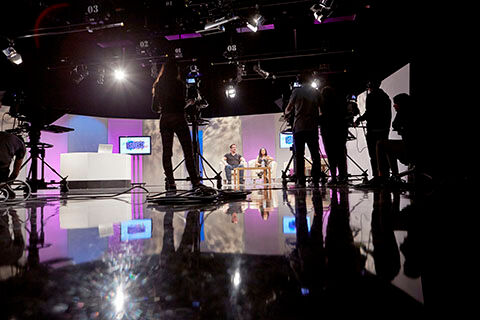
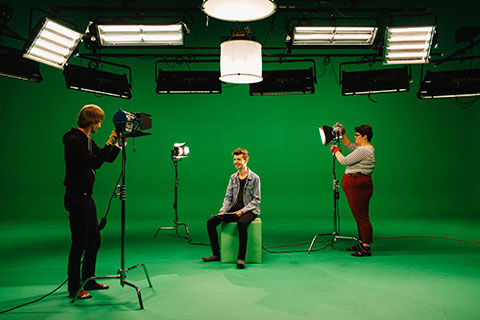
Our Facilities
You will have access to our labs, software, professional sound studios, computer games labs and industry-standard facilities to develop your practical skills in audio, video and multimedia application development, content creation and more.
We are currently undertaking a £400 million investment programme in our facilities, including a major expansion of our City Centre Campus. This includes our brand new £70 million development, STEAMhouse, which is the new home for Computing students. This state-of-the-art centre will give you access to outstanding facilities and equipment, as well as opportunities to collaborate with businesses across multiple sectors and work on real industry-based projects.
Our facilities in Millennium Point have undergone a £6.5million investment with a new maker area, engineering labs/equipment and IT equipment.
Thanks to our partnerships with Cisco, Microsoft, Oracle, Juniper, SAS and LPI you will have access to the latest technology and facilities that reflect advanced professional practice. Our students also have access to software such as the Adobe Suite including Photoshop, InDesign and Illustrator.
Our Facilities
We are constantly investing in our estate and are currently in the process of spending £260 million on new learning facilities. This course will be taught at Millennium Point at the City Centre Campus.
The course is supported with a wide range of cutting-edge facilities in the City Centre Campus. We have a state-of-the-art computer games technology lab which contains high-performance PCs, Sony PlayStation development kits and a range of industry standard software including Unity, Unreal and a suite of professional Microsoft development tools.
We also have many open access areas where students can study together and even hire out laptops for use in these spaces and others within the university.
Within the University there are many internationally recognised research teams giving you the opportunity to collaborate with them on exciting interdisciplinary projects.
Computer networking
The laboratories are well-equipped for all our computer networking courses, as well as specialist areas for practical work such as voice-over internet protocol (VoIP), forensic and ethical hacking technologies, wireless and mobile technologies and radio frequency identification technologies to name but a few.
Software development and computer programming
There are a number of open access, software development and computer programming laboratories that can be used to develop systems and programmes, including database management systems such as MySQL, to name but a few.
Systems laboratories
Our embedded systems laboratories are used to develop real-time systems, such as specialist hardware training and development resources, and industrial-standard software development and simulation tools. These include microcontroller software and robotics design and development, to name but a few.
Electronic systems
To underpin the basic principles of electronic systems, we have a well-equipped laboratory of general and specialist test and measurement kits, including powered prototyping development boards, dual power supplies, frequency generators and counters and digital multi-meters to name but a few.
Forensic computing
Our successful development of forensic computing has led to a specialist forensics laboratory that is fully equipped with essential hardware and software for this sensitive area of study. The laboratory includes high-spec PCs with built-in multi interface Tableau write blockers, EnCase and FTK computer forensic software and steganography detection and analysis software, to name but a few.
Our staff
Dr Roy Priest
Associate Professor of Computing
Based in the College of Computing, Roy is College Academic Lead for Employability and Mobility. Prior to working in higher education, Roy was involved in various aspects of the music industry, as a professional musician and also working in artist management and legal and business affairs.
More about RoyProfessor Islah Ali-MacLachlan
Professor in Engineering Product Design
With nearly 30 years of academic experience and a prior background in industry, Prof. Ali-MacLachlan has made significant contributions to the fields of acoustics, audio engineering, and product design. His work combines research, teaching, and industry collaboration, focusing on creating innovative, practice-informed curricula and fostering...
More about IslahProfessor Cham Athwal
Professor of Digital Technology
Cham Athwal is currently working part-time as a Professor in the Faculty of Computing, Engineering and the Built Environment (CEBE). His main responsibilities are in developing and growing CEBE's activities in India. He has played a major role in developing the Munjal BCU Centre of Innovation and Entrepreneurship (www.MBCIE.org) at Ludhiana in...
More about ChamIan Williams
Professor of Visual Computing and Head of the Digital Media Technology Lab (DMT Lab)
Dr Williams is Professor of Visual Computing and Head of the Digital Media Technology Lab (DMT Lab). He leads the research strategy and vision for the DMT Lab which encompasses the four core domains of: Human Computer Interaction (HCI), Computer Graphics and Computer Vision, Sound and Music Analysis and Broadcast Systems.
More about Ian

